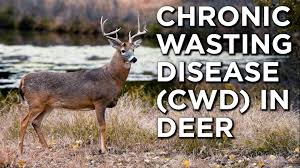
INDIANA — Indiana’s Department of Natural Resources confirmed the first case of chronic wasting disease in the state on Friday in LaGrange County.

DNR stated cases of the disease have been found in wild deer across 33 states, including all of Indiana’s neighboring states.
According to Indiana DNR, finding CWD in that state was likely, given that the county borders a region of Michigan where CWD was found. The disease has been in the area for many years in all surrounding states.
The disease was found in a buck white-tailed deer harvested in Indiana by a hunter and confirmed positive by two separate tests.
CWD is a prion disease that primarily affects the brain, causing symptoms such as stumbling, fatigue, drooling, erratic behavior, and weight loss — leading to an eventual death. CWD may take over a year to affect its host, according to the Centers for Disease Control and Prevention. Currently, the disease has no cure.
The disease is not zoonotic, meaning there are no reported cases of the infection transferring to humans; cattle and other domesticated animals are also not naturally vulnerable to CWD. The disease spreads in deer-to-deer contact and contaminated areas, remaining in the soil for many years.
No cases of CWD have been reported in humans, though the disease can infect certain primates, like monkeys. The CDC reported that some animals become sick by eating meat from deer infected by CWD or coming into contact with the brain or bodily fluids of infected deer.
Currently, no vaccinations or cures are available for CWD, per the DNR. According to the CDC, CWD is always fatal in deer.
DNR urges the public to report wildlife exhibiting CWD symptoms and test deer meat before consumption.
During deer hunting seasons from mid-September until the end of January, the Fish & Wildlife Area or State Fish Hatchery office, as well as Purdue’s Animal Disease Diagnostic Laboratory, are available for sample testing.







.png)











